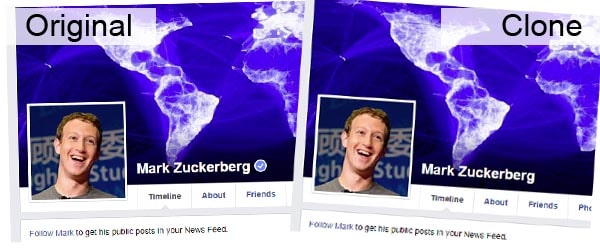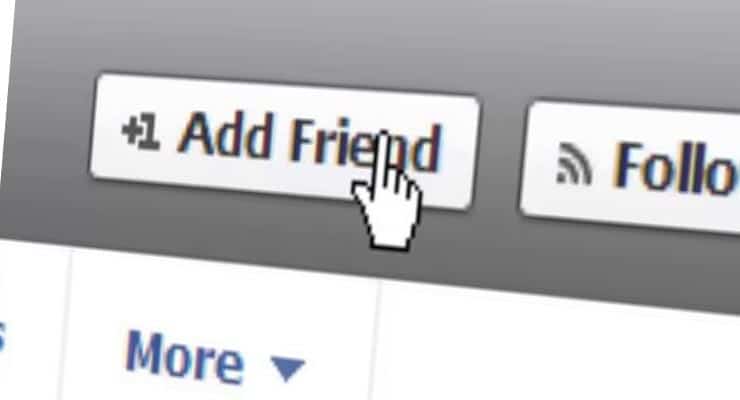Facebook cloning scams – everything you need to know
If you’ve ever received a friend request from someone you are already friends with on Facebook, it is possible that you’ve become a potential target for a Facebook cloning scam.
Facebook cloning scams have been around for years, and are essentially a trick that spammers or crooks can use to try and make you believe you are accepting a friend request from someone you know when it’s actually the crook,
The premise of a cloning scam is actually very simple. The crook picks a Facebook user and creates a new Facebook account using that Facebook user’s full name, cover photo and profile picture, all of which will be available to them since you can’t make hide that information.
What the crook is doing here is creating a “duplicate” account. This means that upon a cursory glance, the account the crook has created appears to be a clone of the Facebook user’s own account. The crook can also copy other public information from the Facebook user’s account to make their clone account look even more like the original account.

It only takes a few moments to create a pretty convincing clone using only a name, profile picture and cover photo.
Armed with the cloned account, the crook then sets about sending friend requests to the friends of that Facebook user. You see, it is not the Facebook user whose account has been cloned that is the real target; it’s his/her Facebook friends. The idea of the scam is to trick the friends into accepting a friend request from the crook disguised as the Facebook user whose account was cloned.
Once the friend request has been accepted, any number of scams can then take place. The Facebook cloning is only the start. The crook may then play out the “friend in crisis” scam which involves tricking a victim into sending money believing they’re sending money to their friend. They may just gather information from Facebook users who accepted the friend request, or may use the cloned account to send spammy or malicious links to those who accepted the friend request.
Sponsored Content. Continued below...
How to protect yourself
Knowing how the scam works is the best way to protect yourself, because now you know that if you do get a friend request from someone you’re already friends with, you will know that it may be a cloned account trying to trick you. As such, we would recommend verifying if the account actually does belong to your friend outside of Facebook before accepting the request.
To prevent your own Facebook account being cloned, you can hide your friends list on Facebook. This will means crooks don’t know who you’re friends with, and will have little reason to clone your account since they won’t know who to send friend request to.
If you do get a friend request from someone and it turns out to be a cloned account, you should let your friend know. They can report the profile using the Report option on the profile itself to tell Facebook who should be able to remove the account.
Sponsored Content. Continued below...
Dispelling some myths
Occasionally we have to deal with misinformation spreading about Facebook cloning scams. Firstly, many messages claim that “almost all accounts are being cloned” like the example below –
Heads-up!! Almost every account is being cloned. Your picture and your name are used to create a new face book account (they don’t need your password to do this this). They want your friends to add them to their Facebook account. Your friends will think that it’s you and accept your request. From that point on they can write what they want under your name. I have NO plans to open a new account. Please DO NOT accept a 2nd friend request from “me”. please forward to all your contacts.
While this does briefly outline Facebook cloning, the claim that it is happening to almost every account is overly alarmist (since it isn’t) and the details quite lacking, so we don’t recommend spreading it. We discuss this message in more detail here.
Additionally some warnings urged users to spread the below message –
Hi….I actually got another friend request from you yesterday…which I ignored so you may want to check your account. Hold your finger on the message until the forward button appears…then hit forward and all the people you want to forward too….I had to do the people individually. Good Luck! PLEASE DO NOT ACCEPT A NEW ONE FROM ME AT THIS TIME
However this message is just causing confusion, since most Facebook users were sending it to each other even if they didn’t get a second friend request from their friends, meaning lots of Facebook users were left to believe their accounts had been cloned when they hadn’t been. As such, we would only recommend sending this message if you actually did get a second friend request from a friend. Again, we discuss that in more detail here.
Finally, some claim that Facebook cloning is “hacking”. It isn’t. No one has compromised the Facebook account of the person who was cloned. It’s a duplicate account. Cloning is a trick, or an illusion. It isn’t hacking and your Facebook account hasn’t been “hacked”.
Keep up-to-date with all the latest cybersecurity threats and our tips to stay safe online. Follow us on Facebook, Instagram and Twitter.
Continued below...
Thanks for reading! But before you go… as part of our latest series of articles on how to earn a little extra cash using the Internet (without getting scammed) we have been looking into how you can earn gift vouchers (like Amazon vouchers) using reward-per-action websites such as SwagBucks. If you are interested we even have our own sign-up code to get you started. Want to learn more? We discuss it here. (Or you can just sign-up here and use code Nonsense70SB when registering.)
Become a Facebook Supporter. For 0.99p (~$1.30) a month you can become a Facebook fan, meaning you get an optional Supporter Badge when you comment on our Facebook posts, as well as discounts on our merchandise. You can subscribe here (cancel anytime.)
